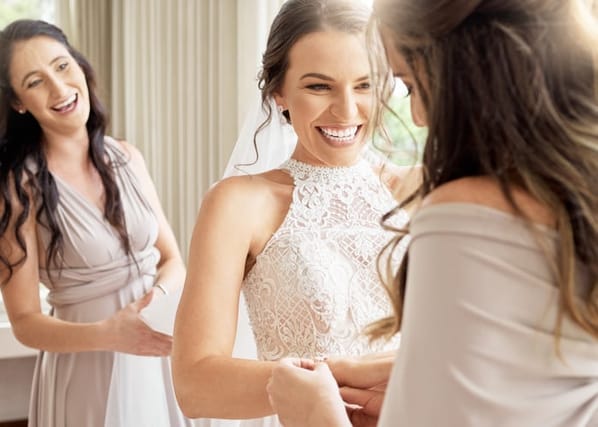Saying something often enough can make it lose its meaning. Words hold significant power, so it’s crucial to understand the implications of a phrase before using it in daily conversations. These are a few surprising expressions you might not realize are sexist until you take a closer look at them.
1. “That’s hysterical.”
 iStock/JovanMandic
iStock/JovanMandic
Hysteria is a word that people use every day. You might describe something hilarious or over-the-top as hysterical, but it actually has sexist roots. It comes from the Greek word “hystera,” which means womb. People first used it to talk about neurotic behaviors in women that they thought were a result of having a uterus. Most people might not know about the original definition now, but it’s worth noting if you want to avoid using sexist phrases that demean people with uteruses.
2. “You have a bubbly personality.”

Anyone can have a bubbly personality. It’s most often a compliment for people who are endearing and enjoyable to be around. Unfortunately, this word comes from a belittling phrase used toward women. It relates to the idea of champagne being a frivolous drink because it bubbles. People held a general cultural belief that mostly women drank champagne because it was a girly, nonsense drink. If you want to describe someone as bubbly, you could use related complimentary words like vivacious, cheerful or animated.
3. “You’re feisty.”
 Shutterstock
Shutterstock
The original meaning of feisty related to small animals that were rambunctious and smelly. The cultural usage of the word turned it into a way to compliment someone on their tenacity, but that’s not how the word began. It’s technically a demeaning comment people can use toward another person of any gender.
4. “She’s a shrew.”

A shrew is technically a small mouse, but Shakespeare’s “The Taming of the Shrew” turned it into a more widely used misogynistic word. He utilized the already existing idea of a woman going against cultural gender norms to create a storyline where the female character needed taming to become submissive and redeemable. Now people might use it as a snide remark against a woman who thinks differently than others because she makes them uncomfortable.
5. “Are you a career woman?”

The idea of being a woman comes with certain societal gender norms. People expect women to appear feminine, get married and have kids. Qualifying a woman with “career” as a descriptor indicates that she’s part of a role-breaking gender subsect that will eventually merge back into the traditional family path. There are better ways to ask a woman about her career interests without using a sexist everyday expression.
6. “You’re so perky today.”

Perky indicates that something has a cocky energy or a point. It’s mostly used to describe the look of a woman’s nipples, so telling someone they’re acting perky is another way to sexualize them with a female body part. Even when meant as a compliment, it can make women feel uncomfortable.
7. “Don’t be frigid.”

Women raised to meet traditional gender roles often spend most of their energy putting everyone else’s needs before their own. When they get burnt out or start drawing boundaries to protect their mental health, people might call them frigid. It comes from a long history of women either being close to shattering if they aren’t emotionally engaging. The word can also passive-aggressively pressure women to hide their negative emotions when it makes other people uncomfortable.
8. “You came across as a bit ditzy.”

Ditzy is a relatively new word. It only entered the picture during the 1980s to describe women who aren’t smart or appear scatterbrained. It would sound strange to hear someone describe a man as ditzy. It has an inherent gender association that’s demeaning at best and insulting at worst.
9. “My ex is crazy.”

Calling someone crazy mostly happens to women, but it can describe men too. The word’s sexist history traditionally dismissed women’s emotions or concerns, especially if their feelings broke gender norms. If you hear someone calling you crazy, it’s helpful to consider if they’re gaslighting you to escape taking responsibility for their actions.
10. “Don’t be such a drama queen.”

Any expression that makes a woman sound crazy due to heightened emotions plays into the misogynistic idea that women can’t control their emotions. It’s another way to belittle a woman while making their worries appear baseless to others.
11. “You must wear the pants in your relationship.”

Wearing the pants in a relationship generally means you have a domineering role with your partner. It comes from the historic precedent that men wore trousers while women wore dresses or skirts. Men also had to be the leaders in traditional relationships. When someone says this phrase to a woman, it’s often a snarky remark meant to passive-aggressively insult the woman for not being submissive enough for societal gender roles.
12. “I’m stuck in the friend zone.”

The friend zone is an everyday expression that belittles men and women. It describes someone who has a crush and inherently deserves to be in a relationship with the person they like. Instead, their crush decides to punish them by sticking them in the friend zone. It dooms the person to pine after their crush forever, becoming the ultimate victim.
Simultaneously, it erases the other person’s right to not be attracted to someone. This relates to how society has typically encouraged women to take anyone who’s interested in them. Otherwise, they get the friend zone guilt trip.
13. “As a rule of thumb, always wear your seatbelt.”

The phrase “rule of thumb” is so commonplace that people are shocked to learn its potentially violent history. Some people think the phrase comes from the old British standard that husbands could beat their wives if the rod was thinner than their thumb. It was never officially the law, so the origin isn’t official. Still, some people believe it’s true and feel offended when hearing others say it.
14. “Always a bridesmaid, never a bride.”
People use this phrase when discussing things they want, but can never seem to achieve. It used to exclusively mean that a woman would experience extreme disappointment every time she attended a wedding as a bridesmaid without also being engaged. If she didn’t get married, she was a societal failure. This isn’t true in the modern world, but the phrase carries its history in any context.
15. “He’s totally whipped.”

The gross violence behind this phrase makes its sexism even worse. People say this when implying that a man will do anything for his female partner, but not because he loves her. Instead, it’s because she’s manipulative and controlling. The equally shared devotion makes people uncomfortable when men are supposed to seem more emotionally closed off in relationships, so they make the woman a bad person with this passive-aggressive comment.
Enjoy this piece? Give it a like and follow Bolde on MSN for more!




